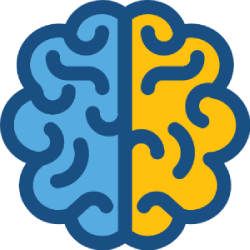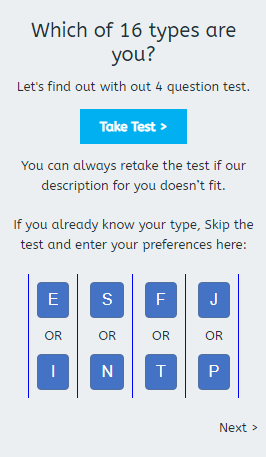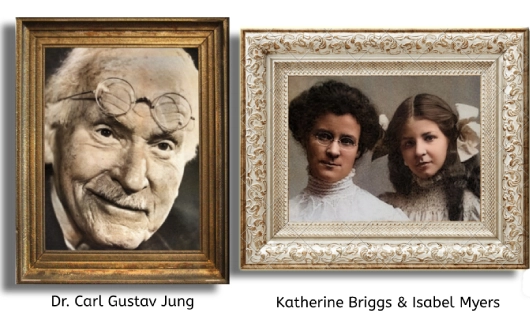
Our Jungian-Based
Indicators
Based on the works of Dr. Carl Jung, Katherine Briggs, and Isabel Myers, MatchMachine uses easily understandable, and widely understood psychological principles to help you get a broad understanding of the characteristics you likely share with others of your type and why you may or may not be compatible with someone in a close personal relationship.

MatchMachine uses an unofficial, modified version of the official MBTI® assessment offered through The Myers-Briggs Company.
Even though our 4-question quiz, called the Jungian Temperament Indicator (JTI) is designed to be quick and painless while still getting the job done, we recommend you take the official assessment to remove any doubts as to which type you are.
You are welcome to retake MatchMachine's JTI quiz at any time and change your results in your MatchMachine profile.
If you want to take more comprehensive (free) tests, see our recommended listing below.

What is the MBTI® and where does it come from?
The MBTI®, or the Myers-Briggs Type Indicator®, is a psychological assessment tool that has been administered in 115 countries, is available in 29 languages, and has been used by 88 of the Fortune 100 within the past five years.
It is based on the theories of Swiss psychiatrist Dr. Carl Jung, and was further developed by Katherine Briggs, and her daughter Isabel Briggs-Myers, starting in 1943.
The MBTI® has since become a widely used personality assessment tool in various settings, including business, education, and counseling. Over 50 million people have taken the MBTI, roughly 2 million per year, according to The Myers-Briggs Company.

How does the MBTI® tool work?
The MBTI® assessment is based on the idea that individuals have innate preferences for certain ways of thinking, feeling and behaving. These preferences are measured across four dimensions:
- Extraversion vs. Introversion: This dimension measures how much an individual tends to focus on the outer world of people and things versus their own inner world of thoughts and ideas.
- Sensing vs. Intuition: This dimension measures how an individual prefers to take in information. Sensing individuals tend to rely on concrete, observable facts, while intuitive individuals tend to focus on patterns and possibilities.
- Thinking vs. Feeling: This dimension measures how an individual makes decisions. Thinking individuals tend to rely on logical analysis and objective criteria, while feeling individuals tend to consider the impact on others and use their personal values as a guide.
- Judging vs. Perceiving: This dimension measures how an individual approaches the outer world. Judging individuals tend to be organized and plan ahead, while perceiving individuals tend to be more spontaneous and adaptable.
Based on their scores on these dimensions, individuals are assigned a four-letter personality type, such as INTJ or ESFP.
It is from these dimensions that many assumptions can be made for how someone perceives information and reacts to their world and how harmonious a romantic relationship with another type can be.
Though MatchMachine's JTI assessment tool is designed to be fast and painless, it does not necessarily ensure exact results.
While no test based on self-assessment ensures exact results, we recommend you take the official MBTI® assessment through The Myers-Briggs Company.

Practical Applications of the MBTI®
The MBTI® provides a comprehensive framework for understanding individual differences and preferences. It's not about measuring skills or abilities but about highlighting differences in the way we perceive the world and make decisions. This insight helps to cultivate empathy and understanding, as we come to see that people who have different preferences from ours are not wrong or strange, but simply different.
In the business world, the MBTI® is used for a multitude of applications. It aids in team building by helping members understand the diverse ways their colleagues think, process information, and make decisions. It's also used in leadership development to improve communication and decision-making skills. Moreover, it can assist in conflict resolution by uncovering the root causes of misunderstandings based on differing preferences.
In the educational sector, the MBTI® can help students to understand their learning styles better, enabling them to adapt their study strategies accordingly. It also helps educators understand how students perceive and process information differently, thus allowing for more tailored instruction.
In the counseling and personal development field, the MBTI® is used to facilitate self-awareness and growth. It can provide insights into individuals' natural strengths and potential blind spots, which can be helpful in career counseling and development, relationship counseling, and personal growth.
Critiques of the MBTI®:
Despite its widespread use and popularity, the MBTI® is not without its critics. Some experts argue that the tool oversimplifies human behavior and personality, which they believe is more complex and fluid than can be captured by the MBTI®'s binary categories. Moreover, there's ongoing debate about the reliability and validity of the test, with critics pointing out that people's type often changes when they retake the test.
Still, the MBTI® remains a popular tool due to its accessible language, positive approach to differences, and its practical application. It serves as a helpful starting point for exploring and discussing differences in perceptions, preferences, and behavior.
In conclusion:
The MBTI® is a complex tool, serving various applications in different sectors. Its real value is derived not just from understanding our own type, but from appreciating and respecting the diversity of types among the people with whom we interact. It's important to remember that while the MBTI® provides a valuable framework for understanding human behavior, it should not be used as a sole determinant for decision making or pigeonholing individuals. It's a piece of the puzzle, not the entire picture.
Alternative MBTI Tests (Free)
PersonalityMax (221 Questions: 25 Minutes)
16 Personalities (60 Questions: 10 Mins)
Human Metrics (64 Questions: 10 Mins)
Crystal (32 Questions: 5 Mins)
Practical Psychology (100 Questions: 15 Mins)

Sign up today!
See how we apply all of our tools to
give you the best possible chances of
finding someone who truly vibes with you.
|

Ben Baker, CEO
About the Author
Ben has practiced Astrology for over 35 years and is a certified Cognitive Behavioral Therapist (CBT) Practitioner. Ben holds 11 patents for the core functions that all dating sites now use today. See Ben's Bio for more info.
|
















Comments